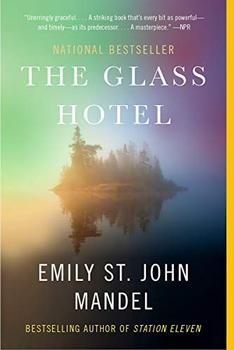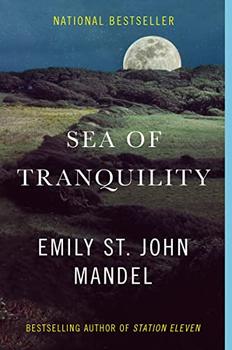Summary | Excerpt | Reading Guide | Reviews | Beyond the book | Read-Alikes | Genres & Themes | Author Bio

Vincent—a young woman named for American poet and playwright Edna St. Vincent Millay—is working as a bartender in a hotel on a remote island in British Columbia, when one day a message is scrawled across the hotel window that reads: "Why don't you swallow broken glass." This sets off the unexpected chain of events that are chronicled by Emily St. John Mandel in her highly anticipated novel The Glass Hotel, which follows Vincent from rural Canada to Wall Street as she becomes involved with a high-level financial executive, whose successful business is revealed to be fronting a Ponzi scheme. This is the first novel that Mandel has published since the release of the wildly successful Station Eleven in 2014.
This novel will likely be approached with trepidation by fans of Station Eleven, fearing that Mandel won't rise up to the high bar she has set for herself. But there's mercifully no reason to worry, because The Glass Hotel is a knock-out of a book, both in comparison to its predecessor and in its own right. The differences between the novels are apparent from the summary alone: notably, Mandel eschews her post-apocalyptic wasteland setting for contemporary Wall Street. But while the bare bones of the two books don't appear to have much overlap, the stylistic similarities are abundant, making this as pleasurable a reading experience as anyone should duly expect from such an exciting, dynamic author.
Mandel's beguiling prose ferries the reader through the lives of a large host of characters, taking us from a remote Canadian island to the heart of New York's financial district, to a ship off the coast of Mauritania (in Northwest Africa): these disparate storylines are synthesized into a single gut-wrenching narrative about love, greed, beauty, memory and delusion. Vincent is a singular, captivating protagonist who holds the distinct storylines together, her fate a question that's left up in the air as we learn early on (the novel is told in a non-linear fashion) that she disappears from the deck of a ship years after the novel's central events unfold. While not necessarily a thriller—Vincent's disappearance feels almost tangential, despite her being the main character—there's an addictive, almost obsessive quality that compels the reader to turn pages both out of excitement and anxiety, though the central themes (and indeed, the central plot) don't make themselves readily apparent at first.
Mandel is an expert at crafting atmosphere and unease; while never outright supernatural, her novel flirts with the suggestion of ghosts as manifestations of guilt. Throughout, she plays with the concept of a "counterlife"—a life that runs parallel to reality, that shows us who we could have been if we had made different choices. (This idea is brought to life in a rather meta way; Station Eleven fans have a treat in store as a familiar face crops up in an unexpected context.) This is ultimately the novel's main conceit: are our choices who we are, and can we ever truly escape them?
The Glass Hotel is Mandel at the top of her craft: from prose to structure to character work to emotional heft, it's a supple, poignant book, as suspenseful as it is quietly affecting.
![]() This review was originally published in The BookBrowse Review in April 2020, and has been updated for the
March 2021 edition.
Click here to go to this issue.
This review was originally published in The BookBrowse Review in April 2020, and has been updated for the
March 2021 edition.
Click here to go to this issue.

If you liked The Glass Hotel, try these:

by Emily St. John Mandel
Published 2023
The award-winning, best-selling author of Station Eleven and The Glass Hotel returns with a novel of art, time, love, and plague that takes the reader from Vancouver Island in 1912 to a dark colony on the moon five hundred years later, unfurling a story of humanity across centuries and space.

The Nine Lives of Rose Napolitano
by Donna Freitas
Published 2022
A deeply moving novel about a woman who thought she never wanted to be a mother--and the many ways that life can surprise us.
Your guide toexceptional books
BookBrowse seeks out and recommends the best in contemporary fiction and nonfiction—books that not only engage and entertain but also deepen our understanding of ourselves and the world around us.